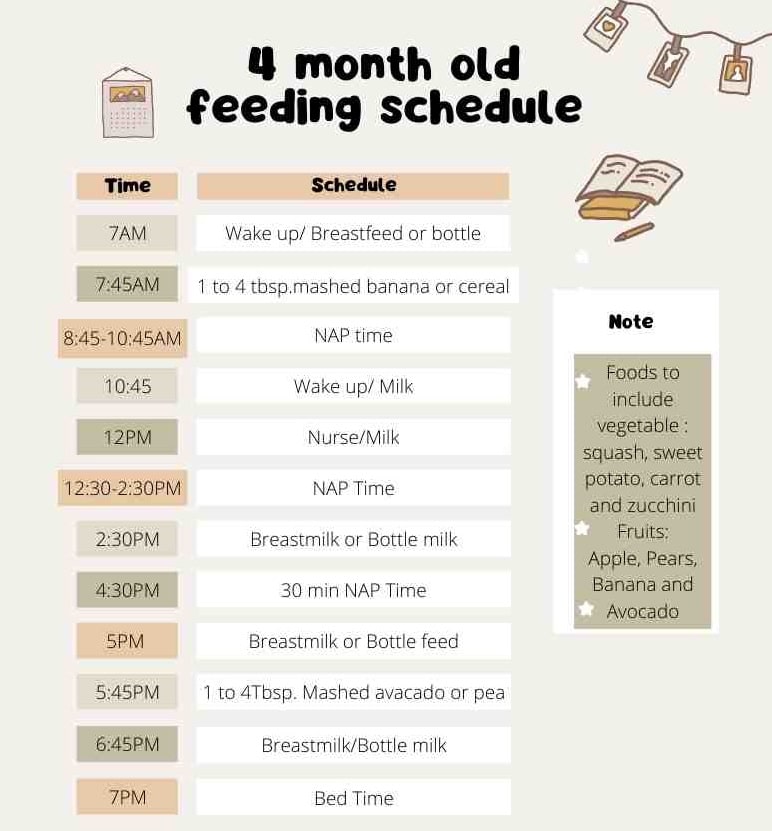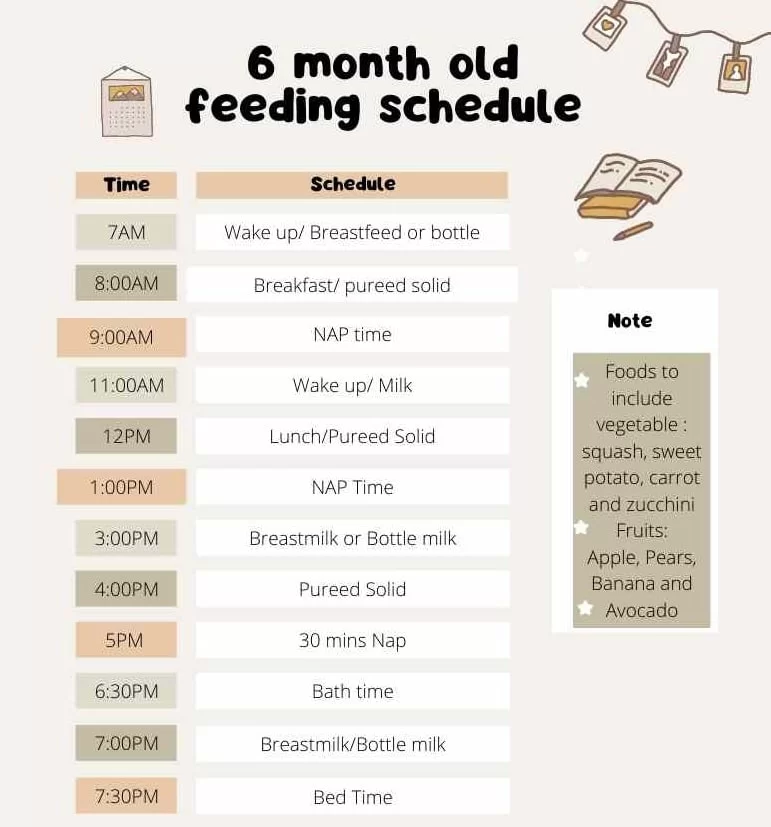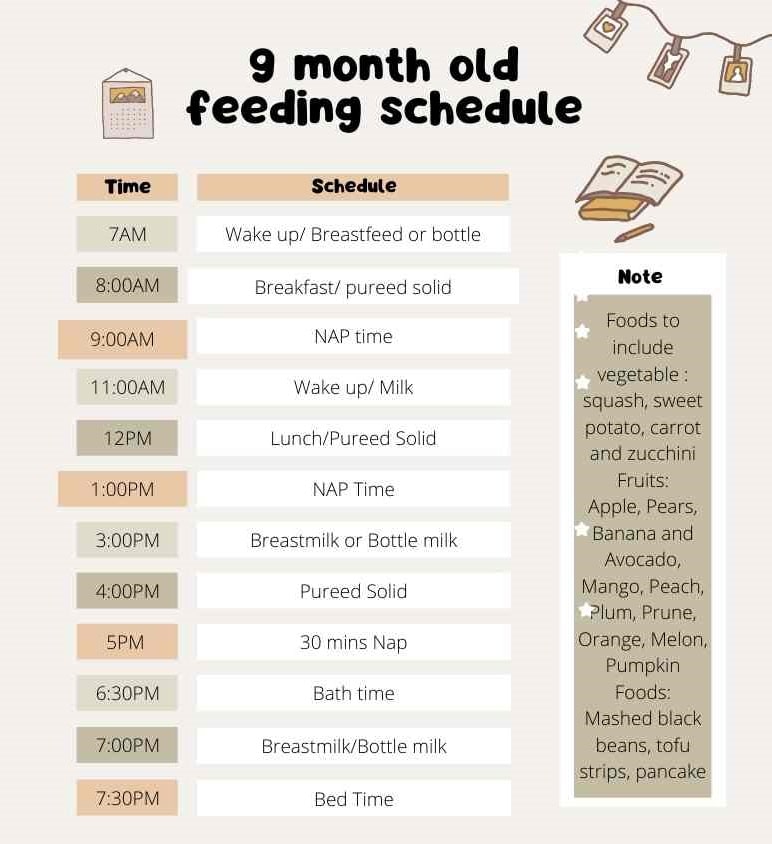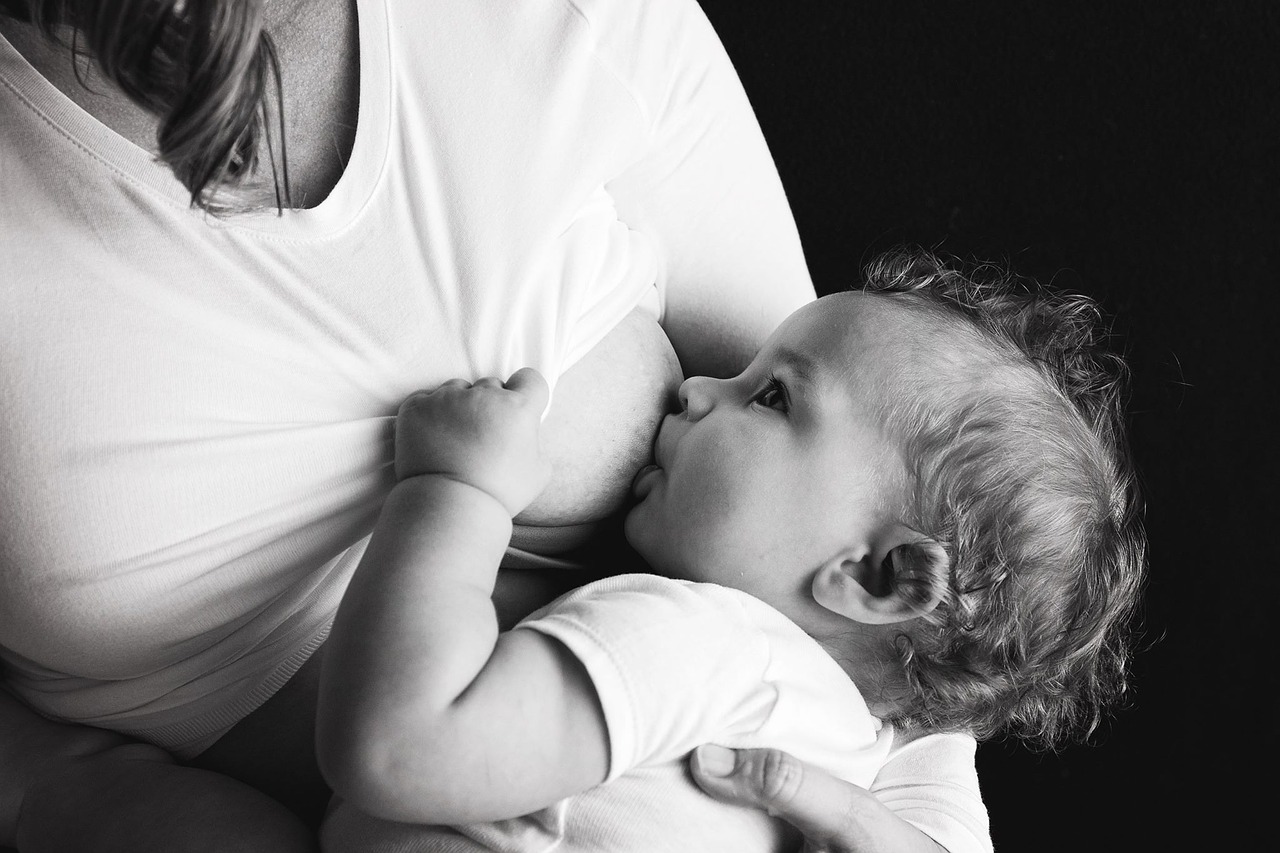Table of Contents
Overview
Starting a baby on a solid schedule can be an exciting time for you and your baby. But before that, many questions come to mind like how and when to start baby on solids and what schedule to follow initially.
What method is the best way to start? What foods should you introduce first? and What to do if your child will not love solids? But don’t worry, here is everything you need to know about starting a baby on solid, including sample schedules.
Things to consider before starting this solid journey for babies
Knowing the best way to feed your baby is essential as a parent. You want them to eat on a schedule, not just whenever they feel hungry.
Read here 91 sweet and adorable quotes for a baby boy
Feeding times should be consistent throughout the day—not just for one meal but also for snacks between meals. Make sure each time slot corresponds with peak activity levels so that when hunger strikes during those times of day, baby will show more interest in solid.
Starting your baby on a solid schedule is an excellent way to ensure that they get the right amount of food and water at the right times every day.
You must also follow a regular schedule for feeding, sleeping, and playtime with your baby. By keeping these things consistent, you can help their brain to develop properly and ensure they will get all the nutrients they need to grow up healthy.
When to start baby on solids
Solid food refers to either traditional baby food or baby-led weaning finger foods—anything besides breast milk or infant formula. Watching for developmental signs is the best way to tell if your baby is ready to start solid foods.
Check my blog about What is sand play? 12 benefits of sand play for kids of all ages.
Some of the development signs to look for are, as soon as you’re sure your child has mastered sitting up and holding the spoon, start feeding them solid foods at least once a day and then move it to twice a day.
Primary source of nutrition is still breastmilk
Breast milk offers all the nutrients a baby needs to grow and develop normally and keeps them healthy. Most mothers will continue to breastfeed their babies until they are 12 months old.
Breastfeeding lowers the risk of diseases and improves immunity. It also helps with weight gain, healthy brain development and immune system function. Breast milk contains antibodies that help your baby to develop a strong immune system—essential because they’re born without one! Breast milk also contains special fats called colostrum which is the first milk.
Colostrum has many antibodies that protect against bacteria in newborns’ intestines; it’s like medicine for an infant’s digestive tract.

Small babies will eat very small portion
The first few weeks are the most crucial time for introducing solid foods into your baby’s diet because their body takes time to adapt to this new change. This might be possible then initially they will not like it or have only 1 or 2 tbsp, which is completely normal.
Check this to know When to start doing tummy time for babies?
This journey will go slow, and they will adapt to this by the time. Make sure, not to force them to eat bigger portion and introduce one food at a time so that you can identify any allergies as well.
Benefits of solid foods for young babies
Here are few of the benefits of solid foods for young babies
Solid foods help aid digestion
Solid foods are an excellent way to help an infant’s digestive system get used to solids and develop healthy eating habits. It is digested more slowly than breast milk or formula, so that babies can get the nutrition they need from their meals.
This helps prevent digestive issues like diarrhea and constipation in babies who can still not digest the proteins found in breast milk or formula easily.
Important for nutrition
The food that you feed your baby will provide them with energy, vitamins and minerals, fiber, protein and fat, which are necessary for healthy development. Energy: Your baby needs a lot of calories each day to keep up with their growth, and they need about 1,000 calories per day to grow and develop properly.
This is why giving them whole milk instead of formula or diluted juice is essential because it has more nutrients than other liquids like water or fruit juice, which are low in nutrients.
Vitamins: Your baby needs vitamins like A & D and B12. These come from the food you eat.
Essential for physical growth and development
Solid foods are essential for physical growth and development. A baby’s skeleton, immune system and nervous system benefit from adding solid foods to their diet. The bones built during infancy are important because they will continue to grow throughout childhood.
If you do not provide your child with adequate nutrients during this period of rapid growth, it can lead to osteoporosis (weak bones) later in life. Solid food also helps build a strong immune system which is necessary to protect against disease.
Help them to be independent
The first thing to know about babies is that they are very much in touch with their bodies. They can sense hunger, thirst and other sensations through the skin.
So, if you offer him a variety of textures and food at every meal—from soft fruits like bananas and melons to hard vegetables like carrots or potatoes—your child will begin to appreciate different kinds of flavors as well textures.
This will help him gain greater control over his food intake and become more independent when it comes time for him to eat solids.
Signs to looks for before starting babies on solids
Here are a few signs that babies give as they grow which are called developmental signs before starting solid journey.
- Your child is reaching for your food.
- They open their mouth voluntarily to accept food.
- They can sit up straight without assistance and has good head and neck control.
- They’re curious about your food or what’s on your plate.
Sample schedule for starting solids at the age of 4 month
If your baby is displaying signs of readiness for solid foods at the age of 4 months, you may want to start with solids introduction.
Read here Is it safe to do intermittent fasting while breastfeeding: Everything you should know
Here is just one point to remember, don’t be in a hurry, they are still small and can have one meal a day or by the time 2 meals a day. The portion will remain small and introduce one food at a time in the interval of 2 to 3 days.
foods to introduce to your four-month-old include:
- Smooth pureed cooked vegetables such as squash, sweet potato, carrot and zucchini,
- Smooth pureed cooked fruits like apples and pears,
- finely mashed fruit like banana or avocado,
- unsweetened, full-fat yogurt.
- Infant cereal

Sample Schedule at 4 month old
- 7:00 AM Wake and nurse or bottle (6 to 8 ounces breast milk or formula)
- 7:45 AM: Breakfast (1 to 4 tablespoons infant cereal/1 to 4 tablespoons mashed banana)
- 8:45 a.m. – 10:45 a.m.: Nap
- 10:45 AM– Wake and nurse or bottle (6 to 8 ounces breast milk or formula)
- 12:00PM- Nurse or bottle (6 to 8 ounces breast milk or formula)
- 12:30 p.m. – 2:30 p.m.– Nap
- 2:30 PM– Nurse (6 to 8 ounces breast milk)
- 4:30 p.m. to 5:00 p.m.– Nap
- 5:00 PM– Nurse or bottle (6 to 8 ounces breast milk or formula)
- 5:45 PM– Dinner (1 to 4 tablespoons mashed avocado/1 to 4 tablespoons puréed peas)
- 6:45 PM– Nurse or bottle (6 to 8 ounces breast milk or formula)
- 7:00 PM—Bed
Sample schedule for starting solids at the age of 6 month
Here are few food options to introduce to a 6 month old baby
Fruits
- Pear
- Apple
- Banana
- Avocado
Vegetables
- Butternut Squash
- Sweet Potato
- Green Peas

Sample Feeding Schedule for A 6-Month-Old Baby
- 7:00 AM – Wake Time; Nurse or Bottle Feed
- 8:00 AM – Eat Pureed Solids
- 9:00 AM – Nap
- 11:00 AM – Nurse or Bottle Feed
- 12:00PM – Eat Pureed Solids
- 1:00 PM – Nap
- 3:00 PM – Nurse or Bottle Feed
- 4:00 PM – Eat Pureed Solids
- 5:00 PM – Nap
- 6:30 PM – Bath time
- 7:00 PM – Nurse or Bottle Feed
- 7:30/7:45 PM – Bedtime
Sample schedule for starting solids at the age of 9 month
Food options to consider at the age of 9 month while starting on solid
Fruits
- Apricot
- Mango
- Nectarine
- Peach
- Plum
- Prune
- Pumpkin
- Orange
- Banana
- Melon
Vegetables
- Carrot
- Parsnip
- Peas
- Squash
- Zucchini
Foods
- Smashed black beans
- tofu strips drizzled with thinned nut butter
- Pancake Strips

Sample Feeding Schedule For A 9-Month-Old Baby
- 7 AM: Breastfeed/bottle feed
- 8 AM: Breakfast – Pancake strips, chopped raspberries and bananas
- 11 AM: Breastfeed/bottle feed
- 12 PM: Lunch – Penne pasta with tomato sauce, green peas, melon slices with skin and seed removed
- 3 PM: Breastfeed/bottle feed
- 5 PM: Breastfeed/bottle feed
- 6 PM: Dinner – Smashed black beans, tofu strips drizzled with thinned nut butter, sliced orange sections with outer membranes and pith removed
- 7 PM: Breastfeed/bottle feed
The best feeding schedule for your baby will require some trial and error, but as long as he is eating a variety of foods and growing healthy, you can be confident that he is well-fed





